As this era of social distancing stretches on and on, distractions become all the more essential to keep us all from slipping into a completely grey state of “meh”.
With all the time on our hands, we’ve found ourselves delving into new discoveries and long-neglected favorites. After all, estranged from those around us, music remains both the great unifier and a much needed soothing presence.
So, Beats Per Minute is here to share some of our recent favorites that have been acting as a salve through these times. We hope these albums offer you a bit of shelter too. In the words of the great Dr. Steve Brule: It’s for your health.
Take a listen to the Spotify playlist here.

Raul Seixas – Krig-ha, Bandolo!
Alceu Valença & Geraldo Azevedo – Quadrafônico
[Philips; 1973] / [Copacabana; 1972]
It feels weird we’ve entered this isolation in full winter regalia and that we’re probably getting out of it in our tank tops and shorts. With spring springing outside and sunshine helping us not to depress too much whilst cheekily teasing us with proper terrace weather, it’s inevitable we turn to brighter landscapes in search of that warmth and vitamin D we’ve all been lacking.
Yes, it’s been a particularly long cold lonely winter, but a twist of post-Tropicália might just be the thing that does the trick — it did for me, at least. I’ve been rediscovering loads of gems from that not-so-sunny Brazilian era (the early 70s marked the beginning of Brazil’s “Years of Lead”, with stricter measures reinforcing a military dictatorship that had been established in 1964), oscillating between established names like Secos & Molhados and Raul Seixas to more obscure, sometimes even forgotten releases. If you’re in need of a tropical twist to get your mood right for when we are finally allowed to lounge like lazy lizards in the sun again, I have two suggestions. First is Raul Seixas’ 1973 classic LP Krig-ha, Bandolo!, which contains legendary hits “Mosca na Sopa” and “Metamorfose Ambulante” and sees writer Paulo Coelho lending a hand with the lyrics. And secondly, a virtually undiscovered 1972 album from Alceu Valença & Geraldo Azevedo titled Quadrafônico (thank you, algorithm!) that features Rogério Duprat aka “the George Martin of Tropicália” as the arranger.
– Ana Leorne
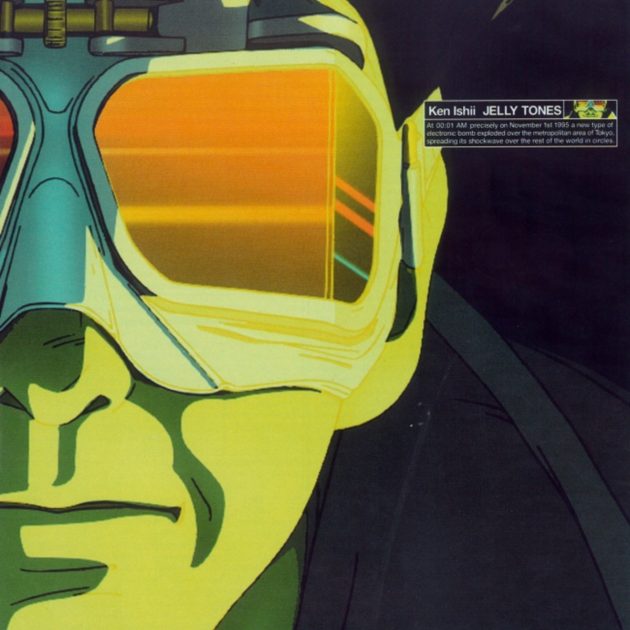
Ken Ishii
Jelly Tones
[R&S; 1995]
To say the least, these are unprecedented times. Alright, we can make historical comparisons, but for all of us, they certainly feel that way. If I’m being honest, on some selfish level, I enjoyed the quarantine at first. The cost to human life was always somewhere on my mind, but as an obsessive consumer of media – whether music, film, or television series – I initially revelled in wrapping myself up in a cocoon of music, Fallout games, and the Criterion Channel.
That was over a month ago (we started isolating much earlier here in Korea). Watching a truly beautiful spring roll into Busan from my window, isolated, alone and, worst of all, completely useless has taken its toll, a feeling I’m sure many of us have. I’ve even found my desire to consume music massively muted. It takes a special something to stir me from boredom and malaise, and my discovery of Jelly Tones was certainly that. Warm, hopeful ambient techno, complete with joyous synths and smooth basslines, this album is all Tokyo: it’s glowing, omnipresent, and damn near everything at once. There’s a certain edge lurking within it, but above all, it’s pure optimism. Oh, and for those in need of a visual companion, “Extra” boasts a music video from the animation director of nothing less than freakin’ Akira. It’s all just what the doctor ordered.
– Chase McMullen
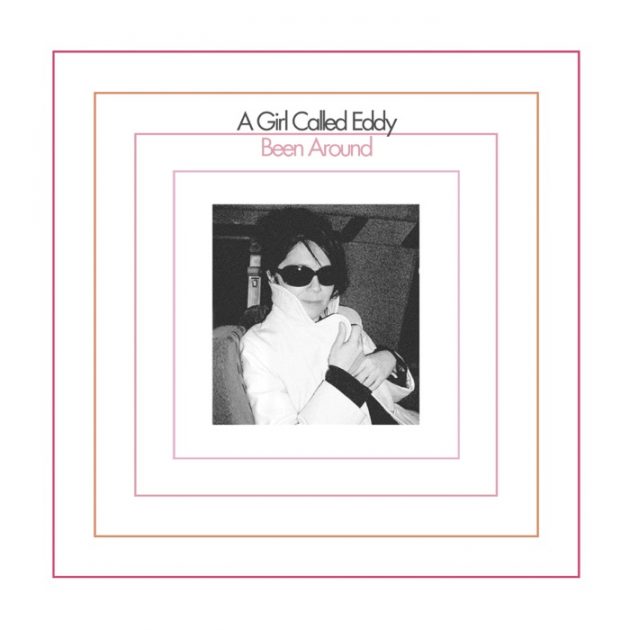
A Girl Called Eddy
Been Around
[Elefant; 2020]
If you’re like me, then this COVID-19-induced quarantine has had a significant impact on your stress and anxiety levels. In times like these, I find one of the best ways to alleviate that elevated stress is with triumphant, exuberant music. Recently, I was introduced to an artist known as A Girl Called Eddy that has filled this need perfectly. England-based singer/songwriter Erin Moran has been making music under the moniker A Girl Called Eddy for over 15 years, but you’d be forgiven if you don’t recognize the name since her new album, titled Been Around, is only her second full-length. After such a long hiatus, Moran is back with a record ideal for uplifting downtrodden spirits. Brimming with lively instrumentals, lush horn arrangements, and some top-notch songwriting, Been Around takes inspiration from a handful of genres including soul, soft-rock, and chamber pop. It’s a record that’s easy to get lost in, and only gets better the further you let yourself sink into its rich sound. There’s no sugarcoating how crummy the state of the world is right now, but A Girl Called Eddy is there to wrap you in a soft, warm blanket of music and gently remind you everything is going to be alright.
– Grady Penna

Julianna Barwick
Circumstance Synthesis
[There; 2019]
You can be a huge fan of someone’s work, and yet have one of their releases slip by you somehow. This is exactly what happened to me with Julianna Barwick, who hasn’t released a full album since 2016’s Will, but managed to sneak out a new five-track EP Circumstance Synthesis at the tail end of 2019 while I was busily putting together my lists (one for Santa and one for albums of the year). That it came out as the second release on RVNG Intl’s new imprint There and was made in collaboration with a New York City hotel may account for my having missed it, though these facts do not impinge on the quality, which is, as always, stunning.
Using a camera on the hotel’s front, pointed skywards, Barwick programmed an AI to trigger certain instrumental cues for different visual appearances – birds, planes, clouds etc. What sounds prosaic in method actually turned out to be something utterly engrossing and organic, and a natural companion to the rest of Barwick’s work. Appropriately, the five tracks are named for the different times of day, starting with “morning” and finishing a brief-but-fulfilling 21 minutes later with “night”. It actually seems as though I wasn’t meant to discover Circumstance Synthesis until now, as it beautifully maps and soundtracks the shifting light of our days from a fixed position, which we all find ourselves now in. This gift of an EP is a reminder that the world is still turning unperturbed, even if we might feel like it’s ground to a halt.
– Rob Hakimian

Aztec Camera
High Land, Hard Rain
[Rough Trade; 1983]
Aztec Camera were jangle pop peddlers who never met a melody they couldn’t improve upon. Founded in 1980 in Scotland by Roddy Frame (the band’s only consistent member throughout its tenure), their music was enamored of new wave and pop aesthetics but was bristling with its own internal rhythmic intrigues. First appearing on a Glasgow cassette compilation for Pungent Records, and later appearing on NME’s C81 collection, the band released their debut record High Land, Hard Rain in 1983 to acclaim and even managed to hit number 129 on the Billboard 200. The songs on the album are propelled by uncertain mechanics, blending pop’s lucid malleability with punk’s strident swagger to staggering effect. They continued to stay active through the mid-nineties, and while their later releases were somewhat varied in quality, their debut remains a high-water mark for the new wave and alternative pop genres.
– Joshua Pickard

Carol Cates
Postcards From Behind a Slammed Door
[handmedown; 2019]
Flirting the line between devastating and hilarious, the second album from Irish cabaret siren Carol Cates makes for a compelling portrait of another person’s life – which is interesting and important to consider in our own little quarantine bubble. Cates fills her album with unyielding attacks on the patriarchy (“Some Men”, “New Myth”) and defiant proclamation of self-worth (“Unfuckable”), but slides them up against light-hearted takes about her ideal partner (“Admin Man”) and confessions about her sex life (“Big Oh”). The production values aren’t high – tinny electric guitar, MIDI drums – but it stands as a testament to hunkering down and setting the world to rights in your own time and on your terms. Plus, the backdrop doesn’t need to be flashy when you have a voice like Cates, whose impressive range is on show, but still doesn’t hit its full effect here (seeing her live will change your life).
With Postcards From Behind A Slammed Door you’ll laugh, cry, and maybe even sit in awe as Cates presents her version of the world. She can tear down whatever target she aims at in a single line – even herself: “By doing absolutely nothing I did everything wrong.” Our own battles are tough, but be sure to take the time to listen to how others are doing, because we’re all either suffering or laughing through the pain.
– Ray Finlayson

Casual Nun
Resort for Dead Desires
[Hominid Sounds; 2020]
The UK is going through a resurgence of bands doing psych rock brilliantly. The Cosmic Dead, Sex Swing, Luminous Bodies and Mugstar are all blending aspects of kosmiche Musik and straightforward rock to explore varying avenues in a well worn, yet not extinguished musical trope. Casual Nun are front and centre of this explosion, playing angst-ridden psychedelia which nods towards a mix of Ash Ra Tempel, Part Chimp and Cherubs. So, pretty damn fucking good, then.
Resort for Dead Desires opener “Party Favors” sounds like a psych band fighting with The Fall, while “Zoetrope” and “A Light Plague” pour out the scuzzed-up garage rock that we expect from Casual Nun by this, their third album. There is room on Resort for Dead Desires for expanse and development as “Rabbits”, “Pink Celestial Heron (pch)” and “Panas, Tejas” shift the album’s trajectory so that it feels like a full body of considered work rather than just some rollicking good songs thrown next to each other. It’s a raucous affair, yet one that is confident enough to find space where needed. If righteous riffage, hollering vocals and pounding instruments are your bag then you’ll love this, if not then you need to reconsider your life.
– Todd Dedman

Neon Bunny
Stay Gold
[Seoulight; 2016]
South Korean-native Neon Bunny’s glistening sophomore album Stay Gold has a lonely feeling to it. This isn’t a bad thing, though, and taking in its delicate, hushed vocals and smooth-as-silk dream pop instrumentals allows the commotion of the world to momentarily fade away. Though it takes some cues from mainstream k-pop, Stay Gold is a much more subdued affair and draws more inspiration from indie and synth pop. Opener “Romance in Seoul” begins with gently plucked strings and a sample of softly-flowing water. It’s a soothing introduction and sets the tone for Neon Bunny’s enveloping sound. With that said, Neon Bunny knows how to make a banger if need be and there’s no better example than “Room 314”. The track begins somewhat tamely, but soon explodes into an instrumental post-chorus filled with booming synthesizers and firm percussion. One of Neon Bunny’s most invaluable traits is her ability to blend multiple genres, languages, and production styles seamlessly into her work, and it’s on full display here.
– Grady Penna
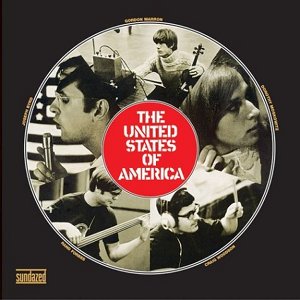
The United States of America
The United States of America
[Columbia; 1968]
Founded in Los Angeles in 1967 by Joseph Byrd and Dorothy Moskowitz, The United States of America were one of the early experimenters of rock music that incorporated electronic instruments into its DNA. Alongside others like Silver Apples and Fifty Foot Hose, they were intensely fascinated with merging psych rock theatricality and the sounds of the burgeoning electronic music scene. Their 1968 debut (and only album) was a masterpiece of melodic tectonics and synthetic tones – utilizing primitive synthesizers and audio processors, they concocted a hypnotic ode to the boundless movements of their collective creativity. They had no guitar player but still felt like a rock band, even if their songs were as left-of-center for their time as you could find. Revolutionary in their aesthetic, the band would help to foster electronic music’s acceptance among rock communities and laid the groundwork for countless artists to come.
– Joshua Pickard
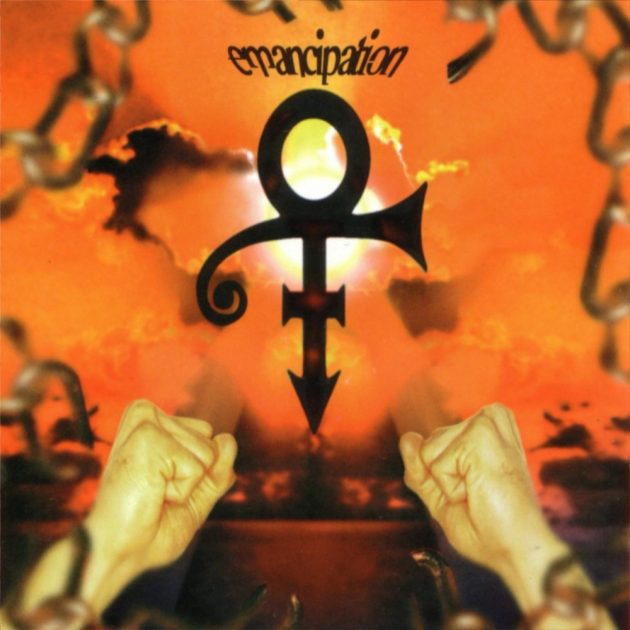
Prince
Emancipation
[EMI; 1996]
I am listening to a lot of Prince at the moment. This is not hugely surprising for me, but I have found myself being gripped by albums that I’d previously seen as stains in his output. I think maybe I’m still mourning his death and yearning for a time long gone when things seemed a little simpler, and I was perhaps more content with myself and my situation. Maybe that time never really existed other than in my perception of the past **heavy sigh**.
Isolation does funny things to the mind. Still, there are some undeniable pearls on Emancipation, amongst the filth of tracks like “Courtin’ Time” and “Sleep Around” which are simply woeful. Reissued last year on SIX slabs of purple vinyl, tracks like “Slave” bring the trademark Prince funk which is always best when bubbling under, subdued rather than played-out like the worst session band at a Hard Rock Café in Little Arse, USA. “Right Back Here in My Arms” suffers from some overly polished production but retains the spirit of peak era Prince, while “Let’s Have a Baby” is the late-night cabaret song his father was well-known for playing, but it centres on a subject matter that breaks your heart – the album was released in the same year that Prince’s son, Amiir, died just six days after being born. It’s interesting how the current allows us to re-evaluate the past. I feel as though I am more readily connecting with someone who felt lost to me for a while.
– Todd Dedman
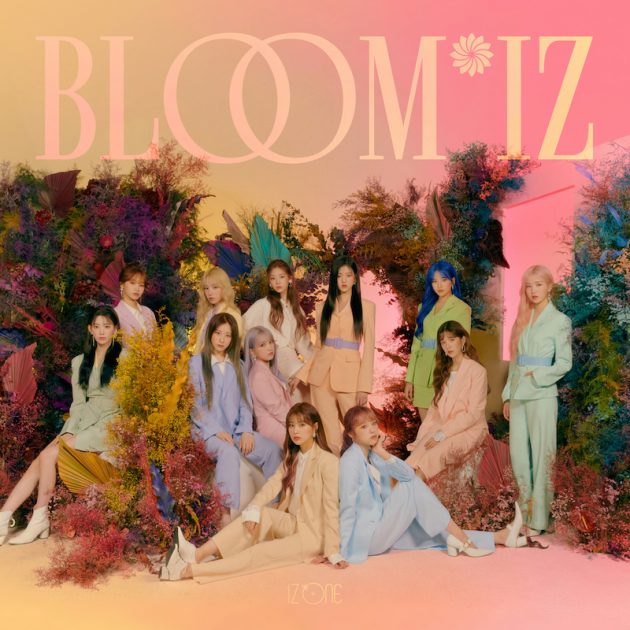
IZ*ONE
BLOOM*IZ
[Stone Music Entertainment; 2020]
Needless to say, pure joy is in short supply these days. Truly great pop might as well be our collective quarantine pusher man: can we just get a fix?
IZ*ONE, to put it lightly, have just what we need. Speaking personally, my K-pop fandom had been wavering. Sulli and Hara’s deaths, a seemingly endless string of industry scandals, and more had taken their toll. So it’s no small thing for BLOOM*IZ to have, at least for its duration whenever it plays, reignited my passion for the genre.
The best K-pop is pure, unfiltered sunshine topped with bizarre mixtures of sounds that, by rights, shouldn’t work, and yet more than do. IZ*ONE bring that in spades, from the fantasy of “Dreamlike” to the spaced-out groove of “Spaceship”. They even swing for the fences on slower songs. “I can’t believe that IZ*ONE saved K-pop,” a friend texted me after I convinced them to listen. Is the man wrong? Even if you’re the type to grumble at bubbly pop, perhaps give this one a go during all this social distancing. For 40 delectable minutes, it might be just the escape you need. You can go back to pretending it didn’t make you dance around your room after, don’t worry.
– Chase McMullen

